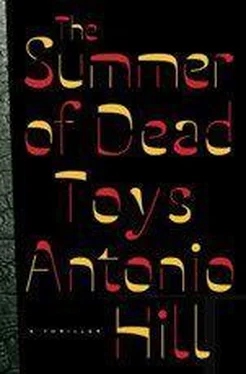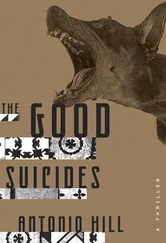Antonio Hill - The Summer of Dead Toys
Здесь есть возможность читать онлайн «Antonio Hill - The Summer of Dead Toys» весь текст электронной книги совершенно бесплатно (целиком полную версию без сокращений). В некоторых случаях можно слушать аудио, скачать через торрент в формате fb2 и присутствует краткое содержание. Жанр: Триллер, на английском языке. Описание произведения, (предисловие) а так же отзывы посетителей доступны на портале библиотеки ЛибКат.
- Название:The Summer of Dead Toys
- Автор:
- Жанр:
- Год:неизвестен
- ISBN:нет данных
- Рейтинг книги:4 / 5. Голосов: 1
-
Избранное:Добавить в избранное
- Отзывы:
-
Ваша оценка:
- 80
- 1
- 2
- 3
- 4
- 5
The Summer of Dead Toys: краткое содержание, описание и аннотация
Предлагаем к чтению аннотацию, описание, краткое содержание или предисловие (зависит от того, что написал сам автор книги «The Summer of Dead Toys»). Если вы не нашли необходимую информацию о книге — напишите в комментариях, мы постараемся отыскать её.
The Summer of Dead Toys — читать онлайн бесплатно полную книгу (весь текст) целиком
Ниже представлен текст книги, разбитый по страницам. Система сохранения места последней прочитанной страницы, позволяет с удобством читать онлайн бесплатно книгу «The Summer of Dead Toys», без необходимости каждый раз заново искать на чём Вы остановились. Поставьте закладку, и сможете в любой момент перейти на страницу, на которой закончили чтение.
Интервал:
Закладка:
“Ruth not answering?” she asked when he put away his mobile.
“No. She’s away. At her parents’ apartment in Sitges. I’ll call her again later. She didn’t find the thing with the DVD very amusing, as you can imagine.” He turned to Sergeant Andreu. “I’m scared, Martina. I feel like my whole world is under threat: me, my house, my family. . And now Carmen. It can’t be a coincidence. Someone is destroying my life.”
“You’re not taking Dr. Omar’s curses seriously, are you?”
He stifled a bitter laugh.
“Right now I could believe anything.” He remembered what the faculty professor had said to him. “But I suppose I must force myself not to fall into that. I’m going to see if there’s any news about Carmen. You needn’t stay.”
She looked at her watch. Ten past four.
“Sure you don’t mind?”
“Of course not. Martina, do you believe me? I know all this seems very strange and all I can ask of you right now is blind trust. But it’s important to me. I didn’t go to see Omar, I didn’t order a pig’s head and I have no clue to his whereabouts. I promise you.”
She took a little while to answer, perhaps more than he hoped and less than she might have needed to give a completely honest answer.
“I believe you. But you’re in a real mess, Salgado. That I will say. And I don’t know if anyone can help you out of it this time.”
“Thanks.” Héctor relaxed his shoulders and looked toward the door of the hospital. “I’m going inside.”
“Keep me posted on any news.”
“Likewise.”
Martina Andreu stayed still a moment, watching Héctor disappear through the entrance to the hospital. Then, slowly, she went to the taxi rank, got into the first cab and gave the driver Salgado’s address.
Sitting on a plastic chair in a corridor near the ICU, Héctor watched the comings and goings of the staff and visitors. At first, he looked at them, but as time passed he half-closed his eyes and focused on their footsteps: fast, slow, firm, anxious. And little by little even that faded from his consciousness, immersed in the memories of what had happened to him over the last five days. The flight, the lost suitcase, the meeting with Savall and the visit to Omar’s clinic were mixed up with the statements of the suspects in the Marc Castells case, the image of Gina bleeding to death in the bath and that macabre vision of the drowned girl in the pool in a film as surreal as it was shocking. He didn’t make the least attempt to put the sequences in order: he let them flow freely in his mind, battle each other to impose themselves on the screen of his memory for a few seconds. Little by little, like the noise surrounding him, these stills began to fade. The chattering calmed, and his brain focused on one particular blurry and poor-quality image, starring him, a violent and brutal Héctor Salgado, beating a defenseless guy with rage. An off-camera voice was added to the image, that of the psychologist, the kid who deep down reminded him of his son. “Think of other moments when you’ve been carried away by rage.” Something he’d refused to do, not just in the past few days but always. But now, waiting for the doctor to give him news of Carmen, that woman who’d treated him almost as a son, he was able to break down the barriers and think of the other moment in his life when rage possessed him: that other day in which everything turned black and all that remained was a bitter taste like bile. His last memory of the first part of his life, the violent end of a phase. Nineteen years putting up with routine beatings at the hands of a “model” father, outwardly a perfect gentleman, every inch an asshole who never hesitated to impose discipline. Why he was normally the target of his rages and not his brother was something the young Héctor had asked himself many times in those nineteen years. That didn’t mean his brother escaped, or anything like it, but as he grew up Héctor noticed a deeper cruelty in the beatings that fell to him. Maybe because his father knew by then that he hated him with all his heart. What he never suspected, not even in the bitterest moments of his childhood, was that there was another victim of these blows, someone who received them behind closed doors, in the intimacy of a bedroom conveniently situated at the other end of a long corridor. How his mother had managed to hide the bruises all those years could be explained only in the context of a home where secrets were the rule and the best thing to do was say little and keep quiet a lot.
He discovered it by accident, one Friday afternoon when he returned early from hockey training because he’d twisted his ankle. He thought no one would be home, since his brother also had training that day, and his mother had said she and his father would be visiting one of his aunts, who was old and unwell. Because of that, he arrived at what he thought was an empty flat, ready to enjoy the solitude that all teenagers long for. He made no noise-that was one of his father’s rules-and that let him hear, with absolute clarity, the rhythmic blows followed by muffled screams. And then something exploded in his brain. Everything around him disappeared except the door in front of him, which he pushed decisively, and his father’s face, going from surprise to panic when his younger son without a second’s hesitation swung the stick into his chest and kept hitting him on the back, again and again, until his mother’s screams brought him back to himself. The following day, still recovering from the beating, his father arranged for this outcast son to continue his schooling in Barcelona, a city in which he had relatives. Héctor understood that this was the best solution: starting again, not looking back. The only thing that he regretted was abandoning his mother, but she convinced him that there was no danger, that what had happened that day was in no way a regular occurrence. He left and forced himself to forget; but this afternoon, sitting on a plastic chair while the memory unfolded clearly in his mind, the anguish vanished to be replaced by a strange feeling of peace, bittersweet but true, that he hadn’t felt since then. And he told himself, calmly, that if injustice and helplessness were the only things that had triggered his rage, in his youth just the same as a few months ago, he didn’t give a damn about the consequences. Let the world say what it will.
He didn’t know how much time had passed, but he noticed a hand jogging his shoulder. Opening his eyes, he saw a figure in white who told him, with an expression designed for giving bad news, that Carmen Reyes González was out of danger, although they were keeping her under observation for at least another twenty-four hours and, of course, it would take a while for her to recover completely. He added, in a routine voice that sounded to Héctor like malicious admonition, that while there didn’t seem to be serious lesions apart from the contusion, they couldn’t rule out complications in the next few hours, due to the patient’s age. He could go in to see her, but only for a moment. And before allowing him in, the doctor with the undertaker’s face commented, in an admiring tone that was hardly professional, that the tenacity with which the older generation clung to life never ceased to amaze him. “They’re cut from a different cloth,” he said, shaking his head as if, in view of what the world was, this was incomprehensible
32
Leire looked at her watch and couldn’t help an irritated gesture. Why did all men disappear when you needed them? I’m starting to talk like María, she thought. But what was certain was that, despite Tomás’s hardly dignified exit, he wasn’t the target of her criticizms at that moment. The inspector had said he would call her mid-afternoon to finalize details. Well, fine; even though “mid-afternoon” wasn’t a precise term, she thought that at least he might have bothered to show signs of life. She resisted calling him; after all, Salgado was her superior and the last thing she wanted to do was fall out with a boss.
Читать дальшеИнтервал:
Закладка:
Похожие книги на «The Summer of Dead Toys»
Представляем Вашему вниманию похожие книги на «The Summer of Dead Toys» списком для выбора. Мы отобрали схожую по названию и смыслу литературу в надежде предоставить читателям больше вариантов отыскать новые, интересные, ещё непрочитанные произведения.
Обсуждение, отзывы о книге «The Summer of Dead Toys» и просто собственные мнения читателей. Оставьте ваши комментарии, напишите, что Вы думаете о произведении, его смысле или главных героях. Укажите что конкретно понравилось, а что нет, и почему Вы так считаете.












